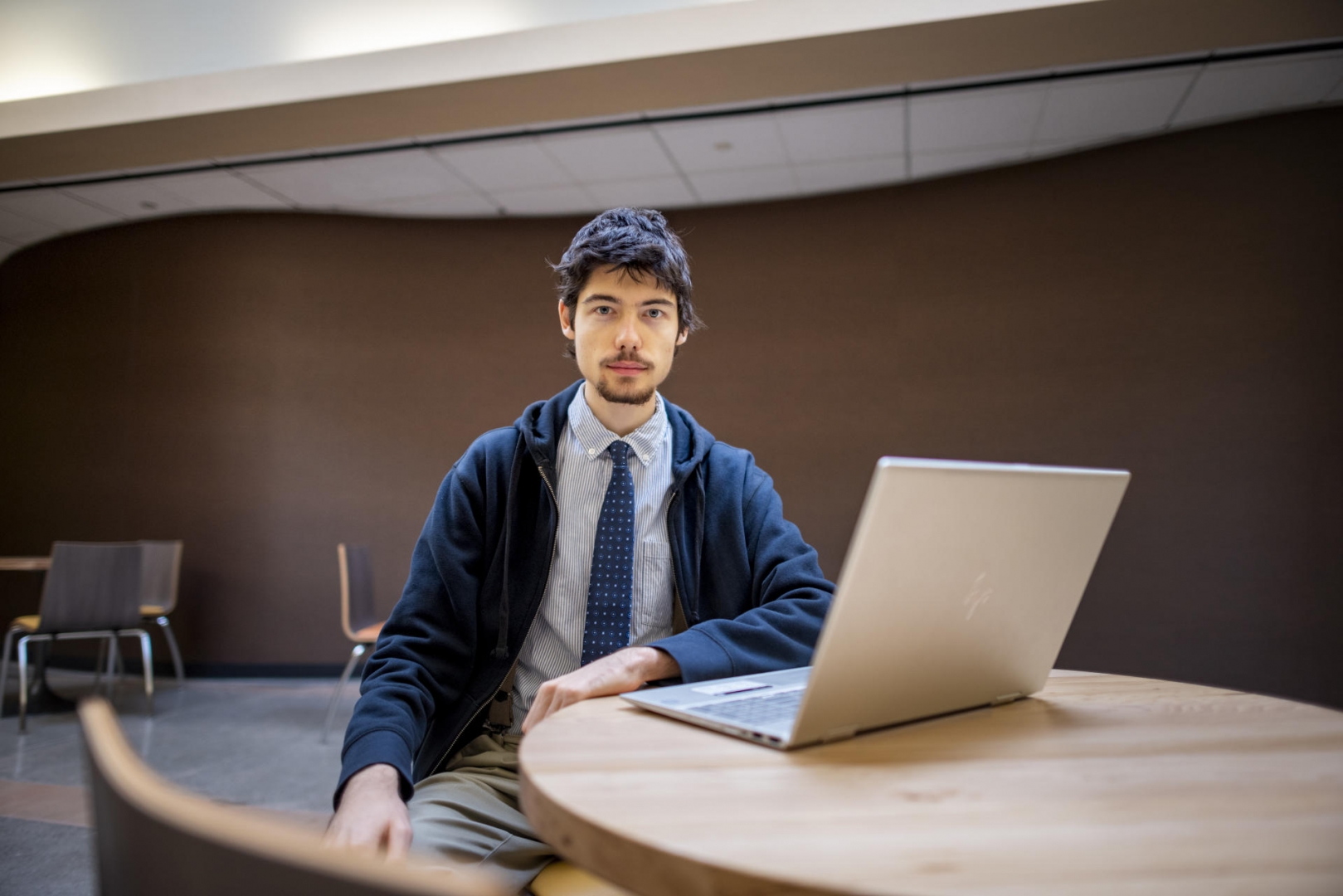Insatiable Curiosity Drives Computer Science Major

Konstantin Rebrov is a computer science student who was considered for the CSU Trustees Award, photographed on Thursday, October 10, 2019 in Chico, Calif. (Jason Halley/University Photographer/CSU, Chico)
Listening to a class lecture, senior computer science major Konstantin Rebrov’s mind is racing. He’s intently focused on the current topic, devising different ways of interpreting and approaching data. Meanwhile, he’s also filling pages with copious notes to reference when he follows up with faculty—as he regularly does—during office hours.
For Rebrov, computer science is more than just his major. It’s a subject that awakens an insatiable curiosity within him and one he connects with on a remarkably deep level.
“[Computer science] is not a subject that you can just take the class and throw it out,” he said. “It’s not something that is to be wasted. It’s my career, it’s who I am. I can’t not be curious.”
Rebrov’s 3.96 grade point average aside, it’s not enough for him just to learn the material to take a test or submit a project for a grade. A nominee for this year’s California State University Trustees’ Award, he enthusiastically adds to what he learns in classes with through a dogged pursuit of knowledge online and in supplemental texts. He also participates in student organizations, like the Association for Computing Machinery and the Information Security Club, in order to learn more.
With the goal of being the first in his family to earn a bachelor’s degree, he knows that whatever he can do to gain a more thorough understanding of computer science and the entire industry as a whole will only help him in the future.
“My university experience is not just getting a degree and that’s it,” he said. “Some people may think, ‘I’ve completed my education and that’s it.’ For computer scientists, the profession entails a lifetime of learning.”
Because it is such a fluid profession, new programming languages are developed, more methods of programming are discovered, or innovative algorithms are invented. And that keeps Rebrov, who comes from a hardworking family of Russian immigrants, striving to be on the cutting edge.
“The field keeps constantly changing,” Rebrov said, “so you need to stay at the top.”
His combined pursuit of learning and unflagging inquisitiveness have impressed his faculty. Kurtis Kredo, associate professor in the Department of Electrical and Computer Engineering, calls Rebrov a “very bright student, almost more so than any other student I’ve seen.”
Kredo added that Rebrov’s approach to learning and preparation is extremely rare, as is “his thoroughness in investigating things not to get a grade, but to actually learn it. The questions that he asks are just absolutely uncommon.”
Kredo and Rebrov are currently collaborating on a research project, performing source code transformations—taking existing computer programs and modifying them in such a way that they are applicable for different technology, such as changing how a program uses memory and performs mathematical calculations.

“It’s not an easy process,” Kredo said, but Rebrov’s passion and attention to detail have certainly proven to be a valuable asset to the project.
Rebrov credits much of his in-class success to his detailed organization outside of class. Ensuring his calendar includes all due dates and deadlines, keeping his desk and study space free of clutter, and using folders and different colored writing utensils all help to keep his mind clear to excel.
Professor Elena Harris said Rebrov has proven himself to be talented, committed, and determined in all three classes in which she has taught him. With his eagerness and enthusiasm, he is always a valued team member in group projects and discussions.
“He is very passionate in solving various real-life problems and implementing programs for them,” she said. “And he shares with me challenging problems that he finds and solves in his own time.”
Rebrov highly values his faculty’s commitment to providing opportunities to actively engage with learning, as well as their encouragement of student participation with questions and suggestions.
“They put their life and soul into their students, and they want to help prepare students to get good jobs,” he said. “They’re really there to help you grow in your skills as a computer scientist.”
While still undecided on his path after Chico State, Rebrov’s future is wide open. Graduate school is certainly on his radar, and his dream job would be working as a computer scientist at Lawrence Livermore National Laboratory.
“It’s a very serious science lab, one of the most important science labs in the United States,” Rebrov said. “They’re working with really advanced technology in computer science and other STEM fields for the benefit of our nation.”
Until then, though, he continues to not waste a single day—tirelessly searching out any piece of information that will advance his learning.
“I’m just someone who works hard,” Rebrov said, “and hard work is more important than anything.”


